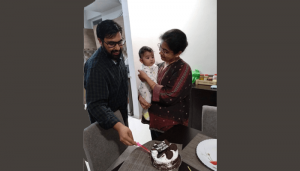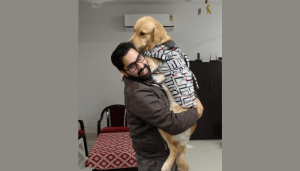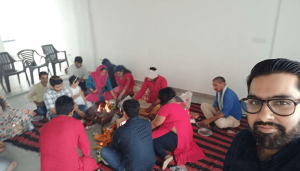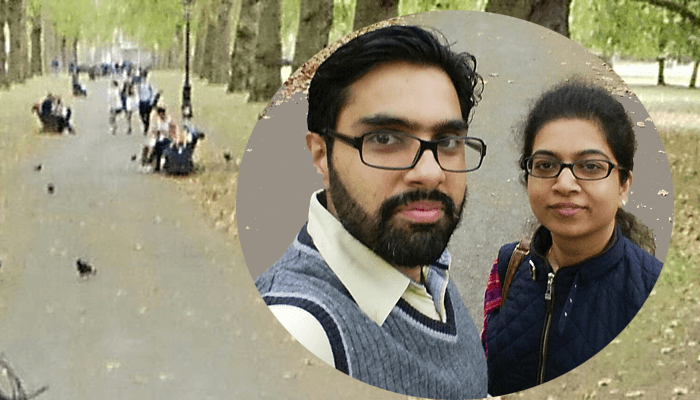Akansh Khurana, CSE batch of 2006 is CEO and Founder of Technology, HealthCare and Big Data Analytics (TBH). They say at IIITH, you become family, keeping a close-knit approach to business, Akansh has his campus best friend as co-founder, junior as his wife, and COO. In an email interview, he talks about getting into ‘trouble’ on campus, the compelling need for a disruption in his life that veered him towards entrepreneurship and how engineering skills come in handy regardless of the profession you eventually choose. Read on.
Please tell us a little about yourself. And what brought you to IIITH?
I am originally from Ambala (Haryana), I grew up there. I now live in Gurugram with my wife Kritika Tandon – who is also incidentally an IIITH alumnus (B.Tech C.Sc. 2008 batch, gold medalist, and very actively involved in extra-curriculars), our 4-month old daughter Avyukta and our naughty 15-month old Golden Retriever, Oscar.


At the time of admissions to IIITH, back in 2002, I hadn’t heard about the institute, but they sent their brochure over to my home, and the backgrounds of the professors caught immediate attention. I made an exploratory trip to Hyderabad along with my father, and there was no looking back. We completed our admission formalities right away. To be candid, I was evaluating dropping a year and re-appearing for IIT, but am so glad we received the brochure, did our research, and took the right decision. I went on to complete my B.Tech in C.Sc. from here in 2006.
Tell us some fun campus stories. You were the Batch President, Cultural Secretary and so on. What was it like?
I was the class rep for almost the entire duration of my engineering. I was actively involved in Felicity, and the cultural activities in Prithvi. I actually spent a lot of time doing extra-curricular activities, and am so glad I did that. Those activities were indeed the best way of engaging with my classmates, as well as with other batches. I had a very strong bond with both my senior and junior batches at the same time. As a testimony to that, I eventually married a IIITH student from the 2008 graduating batch.
I also distinctly remember the time when I was caught in an incident related to ragging (along with two of my other classmates). We didn’t quite do anything, but since the junior batch knew our names more than many others in our class, I was pointed out in the crowd. That was also the time when I developed a deeper connect with Dr. Govindarajulu.
Why did you decide to pursue an MBA after graduating from IIITH?
I was good at the C.Sc. concepts, but I wasn’t great. And I didn’t want to pursue the hardcore software development career if I wasn’t among the best. I figured that I am best suited for a career that leverages my problem solving and quantitative abilities, but at the same time has a strong business foundation. I joined Bain & Company after graduating from IIITH – and I think that was definitely the second most important and apt decision I took (after the admission at IIITH).
My career at Bain had an obvious and automatic evolution into pursuing an MBA. That was the right thing to do to continue honing my management concepts. I went to London Business School in 2011, and graduated from there in 2013. Again, I had a fantastic time there.
Can you briefly tell us what you did after your MBA, leading up to THB. What sectors did you work in and what was your experience in these roles?
I had a good 5+ years of experience before landing up at London Business School. Bain sponsored my MBA, so I came back to work with them for two more years (which was my commitment in return for the sponsorship amount).
The majority of my work at Bain was related to private equity investments and IT services. I did long-term consulting assignments with some of the major IT services giants in India. My background in C.Sc. came in extremely handy during these client engagements.
I also leveraged my time at London to work with three funds – Ennismore Capital in London, Abraaj Capital in Dubai and Helion Ventures in Bangalore. It helped me hone my investment concepts, and develop very good supplementary skills in addition to my work at Bain.
How did you take the decision to start your own company? Also how do you explain the switch from the world of Finance to Healthcare (analytics)?
I hadn’t planned for starting up ever. Definitely not until 9 months before we actually started. I was at a juncture where my career at Bain was excelling and I was growing very rapidly..I felt like I needed to do something completely different. My wife – Kritika – was at McKinsey then, and she could earn the bread for the family — so I figured I needed to take the plunge. Kritika’s support was the biggest reason I could do this.
I had a fair degree of exposure to healthcare while I was at Bain – and that definitely offered the initial connects, as well as the initial thought process of what the opportunities in healthcare could be. I am extremely passionate about healthcare given I am a Type-1 Diabetes Mellitus. And therefore the decision of venturing into healthcare was more personal than professional.
The decision also became easier when my co-founder – Rajesh – also my classmate from IIITH agreed to come on board as the CTO. He was at Microsoft then. He’s not only my best friend from IIITH but one of the best engineers I have known in my lifetime. I could blindly trust him, and he could blindly trust me. Therefore, getting into something new only became more exciting.
Kritika too decided to switch gears to management consulting. She started with Yahoo but went to IIM Lucknow and joined McKinsey. She moved on to work with a healthcare focused consulting firm – Arete Advisors. And now works with us at THB. She’s the CCO/COO at THB.

Please explain what your enterprise THB does.
THB is India’s largest healthcare data exchange. We partner with healthcare providers to generate full-potential value from their clinical datasets. Our offerings include creating data lakes, driving personalized care and medicine for patients, generating real world evidence research, and developing real-time surveillance platforms.
How did your education prepare you to be an entrepreneur? (engineering degree as well as the MBA)
Our business has four important foundations – technology, healthcare concepts, data analytics, and business development. IIITH helped hone my technology and quantitative/problem solving abilities, while my experience at Bain helped strengthen the practical business concepts and the ability to work with CXOs as well as understand the initial opportunities in healthcare. My MBA degree too helped polish all these business concepts.
While Rajesh, our CTO, heads and drives the technology architecture within our company, I look after the business concepts and the business development / client management. Our third co-founder is a big data manager from American Express (ex-IIT Kharagpur, ex-IIM Lucknow) – he focuses on data foundation and analytics.
How is the field of engineering changing entrepreneurship?
Entrepreneurship is definitely on a high tide right now. And seeing the successes around, a lot of people have started to take the plunge and either start their own businesses, or work for early stage companies. Either way, it’s a great experience. I’d encourage every engineer to work with an early stage company and/or build an early stage company. It’s a fulfilling role, and teaches you a whole lot, more than what any large company would.
From your own experience, what advice would you give other engineers who want a successful career?
I’d give three nuggets of advice:
- 99% people are order takers; 1% are order makers — ensure you are in the 1%. And if you are building your own company and/or team, ensure you hire other leaders from the 1%.
- Every bit of experience helps — it will come back to benefit you at some point. I was extremely good at taking actionable notes when I started my career. A lot of people felt it was a stupid task. But that eventually benefited me when our Bain MD started taking me out on important meetings just because he saw this as good ‘listening’ and ‘notes taking’ ability.
- Do what you are best with – the engineering skills will come in handy across any profession you choose. You will be good quantitatively, and you will be a good problem solver. Don’t force yourself to build a software development career if you aren’t the best there. But do pick it up if you are great with it. Leverage engineering skills, and build on your strengths — as a software development professional, or otherwise.

Sarita Chebbi is a compulsive early riser. Devourer of all news. Kettlebell enthusiast. Nit-picker of the written word especially when it’s not her own.


Next post